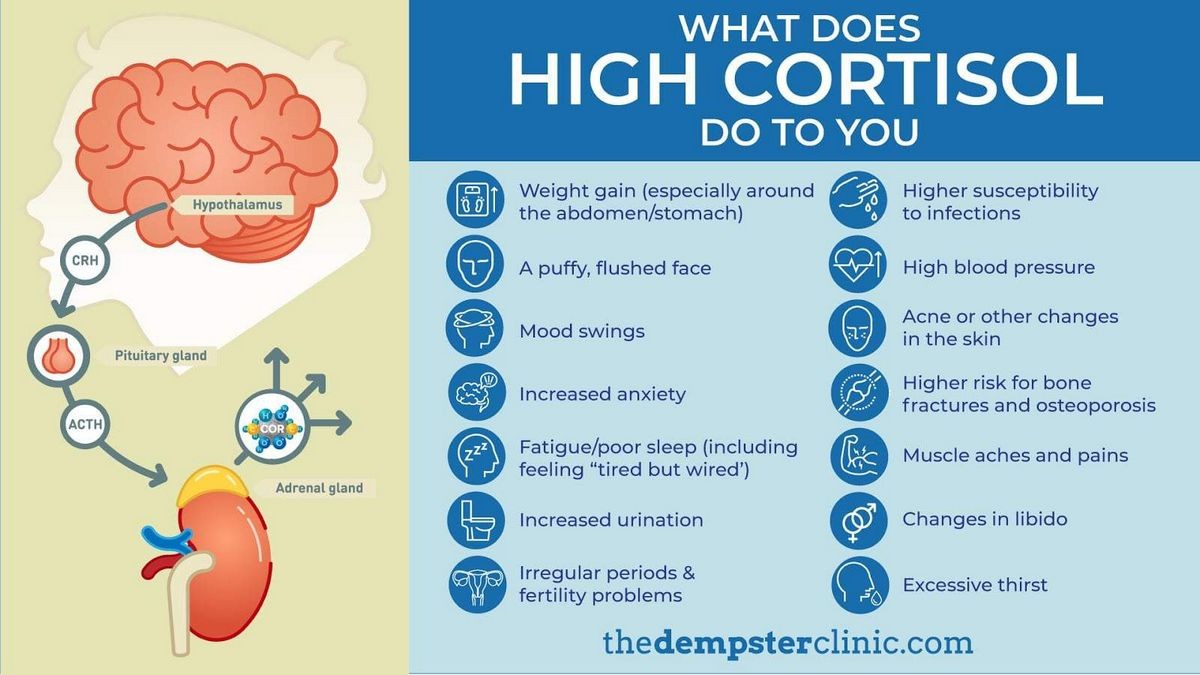
Contents
What Does Cortisol Do to Your Body and What Happens If it’s Too High?
Cortisol is a hormone that plays a central role in your body’s stress response. It maintains blood pressure, regulates circadian rhythm, and reduces inflammation, but if it’s too high it may lead to weight gain and other symptoms.
This article answers questions on what cortisol does to your body and what happens when cortisol levels spike.
Cortisol is produced by the adrenal glands and acts as a messenger between different organs in the body. It is responsible for the body’s "fight or flight" response to stress.
Chemically, cortisol belongs to a family of compounds called glucocorticoids and supports critical cardiovascular, metabolic, and immune functions including maintaining blood pressure and blood sugar levels, supporting metabolism, regulating sleep patterns, monitoring stress response, and reducing inflammation.
Almost all tissues in the body have glucocorticoid receptors. The adrenal glands release cortisol through the HPA axis, which involves the hypothalamus and pituitary glands.
Cortisol levels in saliva, urine, and blood tend to be highest in the morning and lowest at night, following the circadian rhythm. However, cortisol levels can vary depending on activity and sleep-wake cycles.
Glucocorticoids are crucial for the beginning of life, as research shows that without stress hormones, children may die before or at birth.
Cortisol regulates key physiological functions and the body’s stress response.
Stress Response
In response to a stressful situation, the brain triggers the HPA axis, which involves the hypothalamus, pituitary gland, and adrenal glands. This leads to the production of cortisol, providing energy for the body to respond to the situation.
Cortisol also signals the nervous system, causing an increase in heartbeat and breathing rate.
During a stress response, cortisol dilates blood vessels in muscles, increases blood pressure, stimulates digestion, and raises blood sugar levels.
Inflammation
Inflammation is the body’s defense mechanism against external factors. Cortisol limits the inflammatory response by interrupting the process that causes inflammation.
Proteins called cytokines are released at the site of damage, activating pain signals. The activation of the HPA axis leads to the production and release of cortisol, regulating the extent of inflammation.
Inadequate or excessive inflammation can lead to tissue damage and various conditions.
QUESTION
Immune Function
Cortisol balances the effects of the immune system on the body’s cells and surrounding tissue.
When pathogens or tissue damage are detected, components of the immune system reach the affected area and carry out immune functions.
Cortisol enhances the mobility, survival, and function of immune system molecules.
Blood Sugar Levels
Cortisol maintains adequate glucose levels by influencing the liver, adipose tissue, muscle cells, and pancreas.
In the liver, cortisol promotes gluconeogenesis to produce glucose.
In adipose tissue, cortisol activates lipolysis to produce fatty acids that serve as an energy source.
In muscle cells, cortisol lowers glucose intake and breaks down proteins into amino acids for gluconeogenesis.
Cortisol reduces insulin production and increases the production of glucagon in the pancreas, leading to increased blood glucose levels.
What Happens When Cortisol Levels Change?
High cortisol levels can cause Cushing’s syndrome, leading to physical and mental changes such as weight gain, elevated blood pressure, flushed face, anxiety, weak bones, mood swings, and irregular menstrual cycles.
Low cortisol levels can result in Addison’s disease, leading to muscle and weight loss, changes in skin tone, mood swings, and fatigue.
High Cortisol Levels May Affect Your Health
Cortisol is critical for several functions in the body, including stress response, blood sugar regulation, inflammation reduction, and immune response moderation.
Chronic high cortisol levels can lead to serious health conditions. If constantly stressed, consult with a doctor to manage cortisol levels.
Sources: American Psychological Association: "Stress effects on the body," Cleveland Clinic: "Cortisol," Endocrine Society: "Adrenal Hormones."


